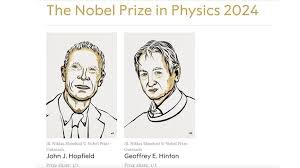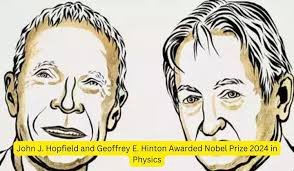John J. Hopfield and Geoffrey E. Hinton Awarded Nobel Prize 2024 in Physics
The scientific community celebrated a monumental achievement with the announcement of the 2024 Nobel Prize in Physics being awarded to John J. Hopfield and Geoffrey E. Hinton. This recognition acknowledges their groundbreaking contributions to the field of physics, specifically in the areas of neural networks and their application in artificial intelligence (AI). Their innovative research has paved the way for advancements that transcend traditional boundaries of physics, leading to revolutionary changes in how machines learn and process information.
Contributions to Neural Networks
John J. Hopfield, a prominent physicist and biologist, is best known for developing Hopfield networks in the 1980s, which revolutionized the understanding of associative memory in neural networks. His work laid the groundwork for numerous applications in data retrieval and pattern recognition. On the other hand, Geoffrey E. Hinton, often referred to as the “godfather of deep learning,” has been instrumental in the development of deep neural networks that mimic human brain functions. His research has significantly advanced the capabilities of machine learning algorithms, enabling applications across various sectors, from healthcare to finance.
Impact on Artificial Intelligence
The award to Hopfield and Hinton underscores the increasing intersection between physics and AI. Their work has not only enhanced theoretical knowledge but also propelled practical applications that have become integral to modern technology. From natural language processing to autonomous systems, the principles established by these researchers have been foundational in building sophisticated AI models that continue to evolve. This Nobel Prize serves as a reminder of the importance of interdisciplinary research in driving innovation and shaping the future of technology.
Global Recognition of Scientific Excellence
The Nobel Prize has long been a hallmark of scientific achievement, celebrating individuals whose work has significantly contributed to humanity. This year’s award highlights the critical role that theoretical physics plays in understanding complex systems and developing technologies that improve everyday life. By honoring Hopfield and Hinton, the Nobel Committee emphasizes the need for continued investment in scientific research and innovation, particularly in fields that blend traditional science with cutting-edge technology.

Why This News is Important
Revolutionizing Technology and Research
The awarding of the Nobel Prize to John J. Hopfield and Geoffrey E. Hinton marks a significant milestone in the field of physics and artificial intelligence. Their research has transformed how we understand machine learning and neural networks, which are crucial for the development of advanced technologies. This recognition not only celebrates their individual contributions but also underscores the importance of interdisciplinary approaches in addressing complex global challenges.
Promoting Future Innovations
The impact of Hopfield and Hinton’s work extends beyond theoretical physics. Their contributions are at the heart of many current innovations in AI, machine learning, and data science. By awarding them the Nobel Prize, the scientific community signals the importance of continued research in these fields, encouraging young scientists and researchers to explore uncharted territories and push the boundaries of knowledge.
Enhancing Educational Curricula
The achievements of Hopfield and Hinton provide valuable case studies for students and educators in various disciplines, including physics, computer science, and engineering. Incorporating their work into educational curricula can inspire future generations of scientists and engineers to innovate and contribute to society.
Acknowledging Interdisciplinary Research
This Nobel Prize highlights the need for collaboration across different fields of study. The convergence of physics, biology, and computer science in their work serves as a model for future research initiatives, encouraging scientists to work together to tackle complex problems. This award emphasizes the significance of fostering an environment where diverse scientific disciplines can unite for greater societal impact.
Encouraging Investment in Research
The recognition of Hopfield and Hinton may lead to increased funding and resources for research in AI and neural networks. By shining a spotlight on their groundbreaking work, this award can influence policy decisions regarding science funding, ultimately benefiting researchers and institutions dedicated to advancing knowledge in these crucial areas.
Historical Context
The journey to the 2024 Nobel Prize in Physics for John J. Hopfield and Geoffrey E. Hinton reflects decades of research and innovation in the realms of physics and artificial intelligence. Hopfield’s introduction of Hopfield networks in the early 1980s revolutionized the way scientists understood neural networks, enabling new approaches to data processing and retrieval. Meanwhile, Geoffrey Hinton’s work in the 2000s on deep learning architectures, particularly convolutional neural networks, has been pivotal in the AI revolution.
The evolution of machine learning techniques has a rich history, with significant milestones such as the development of backpropagation algorithms and the resurgence of interest in neural networks during the 2010s. This decade saw the application of deep learning in various fields, including image recognition, natural language processing, and robotics. The efforts of researchers like Hopfield and Hinton have propelled these advancements, leading to a greater understanding of how machines can learn from data and make informed decisions.
Key Takeaways from “Nobel Prize 2024 in Physics”
| S.No | Key Takeaway |
|---|---|
| 1 | John J. Hopfield and Geoffrey E. Hinton received the 2024 Nobel Prize in Physics. |
| 2 | Hopfield is known for developing Hopfield networks, enhancing associative memory. |
| 3 | Hinton is recognized as the “godfather of deep learning” for his contributions to neural networks. |
| 4 | Their work significantly impacts artificial intelligence and machine learning applications. |
| 5 | The Nobel Prize emphasizes the importance of interdisciplinary research and innovation. |
Important FAQs for Students from this News
Q1: Who are the recipients of the 2024 Nobel Prize in Physics?
A1: The 2024 Nobel Prize in Physics has been awarded to John J. Hopfield and Geoffrey E. Hinton for their contributions to neural networks and artificial intelligence.
Q2: What are Hopfield networks?
A2: Hopfield networks are a form of recurrent neural network that serve as associative memory models, allowing for data retrieval based on partial information. They were developed by John J. Hopfield in the 1980s.
Q3: Why is Geoffrey Hinton referred to as the “godfather of deep learning”?
A3: Geoffrey Hinton earned this title due to his pioneering work in developing deep learning algorithms and architectures, particularly convolutional neural networks, which have significantly advanced artificial intelligence.
Q4: How does the work of Hopfield and Hinton impact modern technology?
A4: Their research has laid the foundation for advancements in AI and machine learning, enabling applications in various fields such as natural language processing, computer vision, and robotics.
Q5: What is the significance of the Nobel Prize for interdisciplinary research?
A5: The Nobel Prize recognizes the importance of interdisciplinary research, emphasizing that breakthroughs in science often occur when different fields collaborate, such as physics and computer science in this instance.
Some Important Current Affairs Links


